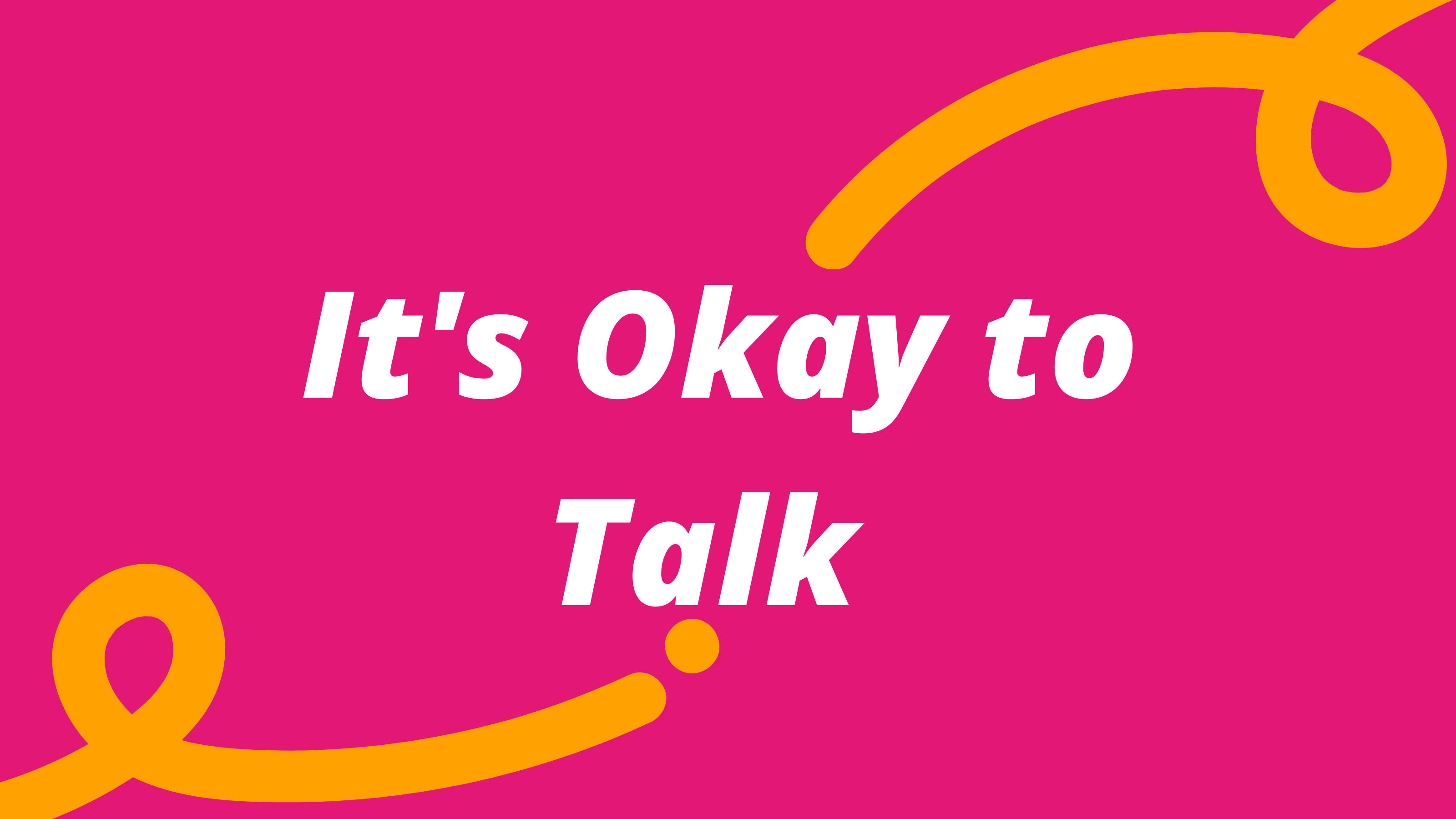
Having a conversation about mental health
Check out our tips on how to have a conversation about mental health.
We know that not everyone is comfortable speaking about mental health, and knowing where to start can be tricky – but having these conversations is one way to help tackle stigma and discrimination.
Below, we’ve pulled out some useful hints and tips from our It’s Okay to Talk resource to help you have a conversation about mental health – whether that’s your own, or someone else’s.
Get started with your conversation by considering these four steps...
Starting a conversation
Is now a good time?
Conversations may be face-to-face, on the phone or via text or email. Different things work for different people.
Time – consider whether or not you are both able to take this on right now. Give people the space to consider whether they can.
What if it’s not a good time? - It might not be a good a time to have the conversation but it is important that if you both can and want to, you identify a better time to chat.
It may be that you can’t have that conversation right now – you may not feel you are currently in the right headspace to talk to someone about how they are doing. Let them know you care but are unable to chat at the moment. You could help them to think of someone else they could talk to if you feel up to it.
Place – For some, it can be useful to find a quiet space with no distractions. Others may find it easier to talk while also doing some sort of activity like going for a walk or doing something creative.
What’s needed - It may be that someone needs the space to offload or vent; it could be that someone is seeking some support. Whatever someone needs, it’s important neither of you feel pressure to fix it or to have all of the answers.
How to Begin
If you've decided it’s a good time to have the conversation – sometimes it can be hard to know how to start. Here are a few ideas.
It’s okay - It’s okay to ask how someone is and ask them more than once. It might be hard for someone to open up about how they are feeling, asking twice shows the door is open.
Ways to ask if someone is okay – “How are you doing?” “How have you been feeling?” “I’m here if you want to chat.” “How’s everything going?”
Ways to let someone know you need to talk - “I’m not doing too well.” “I need to talk.” “It’s not easy to talk about it.” “I trust you.” “Do you have some time to chat?”
Listening and Responding
It can feel difficult to know the right things to say, but sometimes all someone needs is the space to be heard. Here are some tips
Listen without interruption – try to really hear what someone is saying about what they are going through. Try to allow them the space to share how they’re really feeling. You can show that you are listening through your body language.
Reflecting back and showing you care can help – For example, acknowledging that it seems like a difficult time for them. Sometimes we can try to make others feel better by being overly positive, but that might not be helpful to everyone. You can respond using their words to show you are listening.
You might get emotional – Hearing what someone is experiencing may bring up a lot of different emotions as a listener. It’s okay to feel these emotions but if you are able, try and judge whether showing them will be helpful to the other person.
Try not to minimise – Try not to minimise people's experience, or suggest things like 'everyone is feeling like this' or 'it could be worse'. You may say these types of things to try and make people feel like it's not that bad, with the intention of helping. But minimising people's experiences can make them feel like their issues aren't important, or worthy of sharing, which can make them worse as it can stop people from asking for help.
Responding - It’s okay to allow yourself time to process what they are saying and take your time to respond after they’ve shared. This might mean there are times of silence, and that’s okay. You might not know exactly what to say, but you can let them know you are genuinely interested in what they are telling you. You might find it helpful to ask some questions. Try to keep these open (not with a yes or no answer) to help them explore more about what’s going on for them.
If you suspect someone may be thinking about suicide, talk to them. Try to listen, be non-judgemental and do not criticise or blame the person. Letting them know you care, asking about their reasons for living and dying and really listening, trying to focus on their reasons for living in more detail can help. Asking direct questions like, “Do you have a plan?” or, “Are you thinking about suicide?" can help too. Asking about suicide can help the person talk about how they feel - it doesn’t make them more likely to attempt suicide.
Sharing your own experience – Sometimes it may be useful to share your experience of your own mental health. Try to do this sensitively so it doesn’t then become the focus of the conversation – offer if required in case it makes them feel like they aren’t in it alone. It might be worthwhile to check if the other person would find it helpful to hear your experience before sharing.
After a Conversation
Sometimes both of you may need some more support. This could be looking for external help or some time to reflect on the conversation and how you feel.
What would be helpful? - Asking what someone might need or find helpful next is a good question to ask. This might be about exploring support options together. You don’t need to have this information already – you can look for this together. It may be that they needed the space to talk about what they are feeling and experiencing and don’t need you to support with next steps.
If urgent help is needed - It may be that, through the conversation, you become concerned about the other person's wellbeing. This could include finding out if they have made a plan to take their own life. Asking about suicide won’t encourage someone to do it. If you feel that someone is at immediate risk call 999.
Reflecting –Take some time to check in with yourself after the conversation. How are you feeling? How do you think it went? Do you need some support?
What do you do next time you see them? - At the end of the conversation, it might be helpful for the other person to know that the “door is open” to speak another time. Depending on the relationship you have to that person, you may want to organise another time to chat if that is helpful but there shouldn’t be any pressure on either of you to do so.
The next time you see them, they may not want to talk about their mental health – be led by them.
It’s Okay to Talk has more useful information to help you get talking about mental health. Our conversation starter card has useful tips on how, when and where to have a conversation. The facilitation pack also has a handy listening and responding exercise, where you consider how you use your body language, how you encourage other people while they speak, and what an appropriate response feels like.


